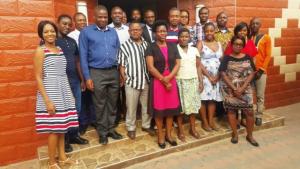WHO Supports Orientation of Health Institutional Heads in the management of Gender Based Violence survivors
Lusaka, 15th November 2016 - The WHO Country Office in collaboration with the Ministry of Health conducted a training workshop for orientation of health staff heading health institutions in the clinical management of Gender Based Violence (GBV) survivors using a multi-sectoral approach. The workshop took place from 31 October to 4 November 2016 in Lilayi, Chilanga District. A total of 42 participants were in attendance. These included District Medical Officers, Senior Medical Superintendents, Medical Officers and Heads of Clinical Care. The institutions represented were from all the eight districts of Lusaka Province namely: Lusaka, Chilanga, Luangwa, Chongwe, Shibuyunji, Kafue, Rufunsa and Chirundu.
The prevalence of gender based violence in the country has increased over the years. This has necessitated the building of capacities in clinical management of survivors of Gender Based Violence for health workers. Very few health facilities have One Stop Centres for GBV and a limited number of staff has been trained particularly using a multi-sectorial approach.
WHO under the GRZ-UN Joint Programme with the help of Ireland and Sweden has been supporting the Ministry of Health both financially and technically in the health pillar outcome which is targeted at increasing access to timely and appropriate health services for GBV survivors. This entails that health care providers should know the guidelines and protocols of GBV as they carry out their work in dealing with GBV survivors. It is also important that they know the legal and social aspects and how these sectors operate in order to ensure a coordinated response.
Management of Gender Based Violence (GBV) and Violence Against Children (VAC).
The orientation had four components namely: Clinical management; GBV guidelines and treatment protocols; Legal presentation and Psychosocial counselling. The participants were taken through the 5 major steps in the management of GBV survivors and in the management of Violence Against Children as follows:-
- Emergency and life threatening injuries.
- Prophylactic treatment with the following guidance:-
- Truvada and Aluvia (PEP) were to be administered within 28 days.
- If a client is already HIV positive, Care, Treatment and support should be administered.
- Emergence Contraception should only be administered to females in the reproductive age group.
- An oral contraceptive pill can also be administered.
- Provision of Mental Health Care.
- Follow up after the above three steps have been administered:-
- Sexual assault cases were supposed to be reviewed within 1-2 weeks of the assault as diseases like Gonorrhoea manifested after about a week after a sexual encounter.
- The last follow up visit after a sexual assault should be conducted after 3 months.
- Dealing with post-traumatic stress disorder:-
- Refer Post-traumatic stress disorder which would not be managed effectively by a psychosocial counsellor.
- The use of Cognitive Behavioural Therapy is recommended.
- Pregnancy counselling and support. If pregnancy caused risks, then safe termination would become an option.
- Look out for infanticide symptoms and be knowledgeable of the whereabouts of the Social Welfare service points and the police service.
Abortion laws
- Constitutional guidance - The Zambian legislative framework on the termination of pregnancies is defined by three principal Acts of Parliament:-
- Republican Constitution: - makes allowance for the termination of pregnancies, provided such is done within the laid down conditions of the law.
- Penal Code makes provision for safe abortion by criminalizing unsafe and illegal abortion methods.
- The Termination of Pregnancy Act is the principal legislative Act on the termination of pregnancy. It was enacted in 1972 with amendments in 1994. The Termination of pregnancy Act provides for the legal termination of pregnancies within defined spheres.
- Penal Code of 2005 – Allows that if rape/defilement took place, then abortion would be the option. The Act provides the general framework under which a pregnancy can be terminated. According to the Act, an abortion in Zambia can be conducted under the following circumstances:-
- That the continuation of pregnancy would involve-
- risk to the life of the pregnant woman; or
- risk of injury to the physical or mental health of the pregnant woman; or
- risk of injury to the physical or mental health of any existing children of the pregnant woman; greater than if the pregnancy were terminated; or
- That there is a substantial risk that if the child were born it would suffer from such physical or mental abnormalities as to be seriously handicapped.
- The Ministry of Health implementation plan indicated that non-doctors were being trained in forensic evidence compilation.
- The focus would be on the survivor and not the perpetrator.
- That the continuation of pregnancy would involve-
There is need to have forensic evidence and therefore, Hospitals that have One Stop Centres should acquire machinery for that purpose.
One Stop Centres (OSC)
One Stop Centres (OSC) are places within the health care facility were services for GBV survivors are offered, so that the survivor does not move from place to place.
- Ideally services should be available 24 hours a day, and 7 days a week (practically 08:00-17:00 hrs).
- Staff: Data support staff, counsellor, clinician, nurse, social worker, Legal/Paralegal officer & police officer. All staff working in the OSC/CRC must be trained in handling GBV cases.
- Space: Ideally three rooms: - counselling room, examination room, and waiting/ play room for children.
- Equipment: – Lithotomy bed, colposcopy/Digital camera, light source, furniture, linen, toys and medical/surgical consumables.
- Logistics: Transport, Computer(s), Stationery, Filling Cabinet, Phones.
For more information contact:-
Rita Nacidze
Gender and Health Officer
+260 211 255322
nacidzer [at] who.int (nacidzer[at]who[dot]int)
GPN: 37641
Nora Mweemba
Health Promotion Officer
+260 211 255322
mweemban [at] who.int (mweemban[at]who[dot]int)
GPN: 37609



